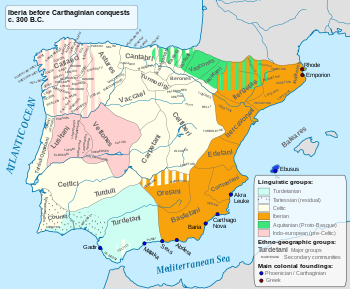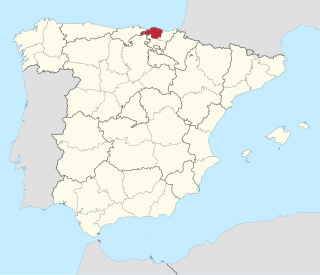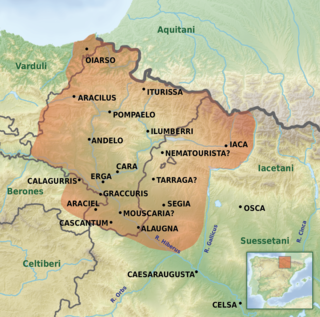
The Caristii were a pre-Roman tribe settled in the north of the Iberian Peninsula, in what today are known as the historical territories of Biscay and Álava, in the Basque Country, northern Spain.

The Caristii were a pre-Roman tribe settled in the north of the Iberian Peninsula, in what today are known as the historical territories of Biscay and Álava, in the Basque Country, northern Spain.
Their historical territory today corresponds very well with the extension of the Biscayan dialect of the Basque language, however it is discussed whether the Caristii were actually Aquitanians, related to the Vascones, or if they were Celts, related to tribes such as the Cantabri and Celtiberians and that later suffered a Basquisation. [1]
The Caristii are first mentioned by Roman sources; Pliny the Elder names them Carietes and places them in the Basque interior territories, what today is the southernmost regions of the Basque Country, while Ptolemy places them between the river Deba and Nervión, present-day provinces of Biscay and Gipuzkoa, with a territory triangle-shaped, reaching the city of Vitoria by the south. Their territory limited with the Varduli at east, Cantabri at west and Autrigones at southwest.
Their main cities were Tullica, probably Tuyo, Erriberagoitia in the banks of the river Zadorra; Suessatio, which could be present-day Arkaia; and Veleia or Velegia , the last two were located near the Roman road from Bordeaux to Astorga.; [2] [3] another city in their land was Vesperies, on the Atlantic coast (south coast of the Bay of Biscay). The toponyms of their cities are of Indo-European origin (Celtic or Proto-Celtic languages), Tullica (from "Tullo", valley), Suessatio (well settled). As it happens with their neighbors, the Varduli, not a single toponym related to the Aquitanian-Basque languages has been found, further proving the theories about their possible Celt origin and possible late Basquisation.
They are not mentioned again in the Early Middle Ages, on their place appeared the precursors of the provinces of Biscay and Alava. Some authors [4] deducted, following Classic documents, the existence of some ethnic affinity, collaboration, or political union between Caristii, Autrigones and Varduli, tribes who later would all be grouped under the name Varduli, this would explain all the later events on this region, for example, why once the Caristii and Varduli were moved out of their original territories by the Vascones in the Early Middle Ages, the Caristii and Autrigones lost their names and were grouped together with the Varduli. The union, whichever the causes, between Varduli, Caristii and Autrigones on a unique territory would later create the County of Bardulia, part of the Crown of Castile.
The Basques are a Southwestern European ethnic group, characterised by the Basque language, a common culture and shared genetic ancestry to the ancient Vascones and Aquitanians. Basques are indigenous to, and primarily inhabit, an area traditionally known as the Basque Country —a region that is located around the western end of the Pyrenees on the coast of the Bay of Biscay and straddles parts of north-central Spain and south-western France.

Biscay is a province of Spain and a historical territory of the Basque Country, heir of the ancient Lordship of Biscay, lying on the south shore of the eponymous bay. The capital and largest city is Bilbao.

The Iberians were an ancient people settled in the eastern and southern coasts of the Iberian peninsula, at least from the 6th century BC. They are described in Greek and Roman sources. Roman sources also use the term Hispani to refer to the Iberians.

The Basque Country is the name given to the home of the Basque people. The Basque Country is located in the western Pyrenees, straddling the border between France and Spain on the coast of the Bay of Biscay.

The Vascones were a pre-Roman tribe who, on the arrival of the Romans in the 1st century, inhabited a territory that spanned between the upper course of the Ebro river and the southern basin of the western Pyrenees, a region that coincides with present-day Navarre, western Aragon and northeastern La Rioja, in the Iberian Peninsula. The Vascones are often considered ancestors of the present-day Basques to whom they left their name.

The Aquitani were a tribe that lived in the region between the Pyrenees, the Atlantic Ocean, and the Garonne, in present-day southwestern France in the 1st century BCE. The Romans dubbed this region Gallia Aquitania. Classical authors such as Julius Caesar and Strabo clearly distinguish the Aquitani from the other peoples of Gaul, and note their similarity to others in the Iberian Peninsula.

The Aquitanian language was the language of the ancient Aquitani, spoken on both sides of the western Pyrenees in ancient Aquitaine and in the areas south of the Pyrenees in the valleys of the Basque Country before the Roman conquest. It probably survived in Aquitania north of the Pyrenees until the Early Middle Ages.

The Cantabri or Ancient Cantabrians, were a pre-Roman people and large tribal federation that lived in the northern coastal region of ancient Iberia in the second half of the first millennium BC. These peoples and their territories were incorporated into the Roman Province of Hispania Tarraconensis in 19 BC, following the Cantabrian Wars.
The origin of the Basques and the Basque language is a controversial topic that has given rise to numerous hypotheses. Modern Basque, a descendant or close relative of Aquitanian and Proto-Basque, is the only pre-Indo-European language that is extant in western Europe. The Basques have therefore long been supposed to be a remnant of a pre-Indo-European population of Europe.

The Varduli were a pre-Roman tribe settled in the north of the Iberian Peninsula, in what today is the western region of the Basque Country.

The Autrigones were a pre-Roman tribe that settled in the north of the Iberian Peninsula, in what today is the western Basque Country and northern Burgos and the East of Cantabria, Spain. Their territory limited with the Cantabri territory at west, the Caristii at east, the Berones at the southeast and the Turmodigi at the south. It is discussed whether the Autrigones were Celts, theory supported by the existence of toponyms of Celtic origin, such as Uxama Barca and other with -briga endings and that eventually underwent a Basquisation along with other neighboring tribes such as the Caristii and Varduli.

Novempopulania was one of the provinces created by Diocletian out of Gallia Aquitania, which was also called Aquitania Tertia.

The Basques are an indigenous ethno-linguistic group mainly inhabiting the Basque Country. Their history is therefore interconnected with Spanish and French history and also with the history of many other past and present countries, particularly in Europe and the Americas, where a large number of their descendants keep attached to their roots, clustering around Basque clubs which are centers for Basque people.
Late Basquisation is a minority hypothesis that dates the arrival of the first speakers of the Basque language in northeastern Iberia from Aquitaine to the 5th or 6th century AD – as opposed to the mainstream view of it being the last remaining descendant of one of the pre-Indo-European languages of Prehistoric Europe.

The Turmodigi were a pre-Roman ancient people, later mixed with the Celts people of northern Spain who occupied the area within the Arlanzón and Arlanza river valleys in the 2nd Iron Age.

The Allotriges or Allotrigones, were a small 'Celticized' mountain people mentioned alongside the Plentauri by Strabo, as inhabitants of the region roughly corresponding to present-day northwestern La Rioja, around the area of the Ebro sources.

According to some sources, Bardulia is the ancient name of the territories that composed the primitive Castile in the north of what later became the province of Burgos. The name comes from Varduli, the name of a tribe who, in pre-Roman and Roman times, populated the eastern part of the Cantabrian coast of the Iberian peninsula, primarily in present-day Guipúzcoa. Some assert that the Varduil also encompassed or assimilated the Caristii and Autrigones.
The Suessetani were a pre-Roman people of the northeast Iberian Peninsula that dwelt mainly in the plains area of the Alba (Arba) river basin, in today's Cinco Villas, Aragon, Zaragoza Province and Bardenas Reales area, west of the Gallicus river, east of the low course of the Aragon river and north of the Iberus (Ebro) river, in the valley plains of this same river. Their location, in relation to other tribes, was south of the Iacetani, west of the Vescetani or Oscenses north of the Lusones and Pellendones, also north of the Sedetani, and southeast of the Vascones.